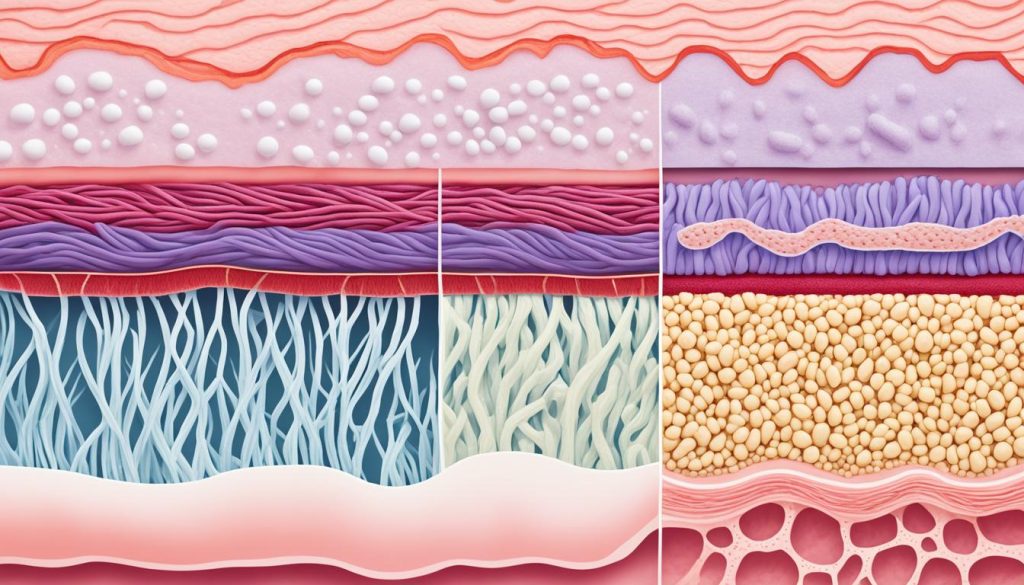After achieving significant weight loss, many individuals are often left with loose skin that can be bothersome and affect self-confidence. This article will explore the causes of loose skin after weight loss and provide proven tips on how to tighten and get rid of it, including natural remedies and surgical options.
How to Get Rid of Loose Skin After Weight Loss?
The skin is the largest organ in the body and plays a crucial role in protecting our internal organs. It is made up of proteins, specifically collagen and elastin, which give it strength, firmness, and elasticity. These proteins work together to keep our skin tight and prevent sagging.
However, when you lose a significant amount of weight, especially in a short period of time or over a prolonged period, it can lead to loose skin. This occurs because the collagen and elastin fibers in the skin become damaged or stretched beyond their normal capacity. As a result, the skin loses its ability to bounce back, resulting in sagging or excess skin.
Several factors can contribute to the loss of skin elasticity during weight loss. One factor is the natural process of aging, as the production of collagen and elastin decreases over time. Additionally, genetics can influence how well your skin responds to weight changes, with some individuals naturally having more elastic skin than others.
Exposure to the sun’s harmful UV rays can also contribute to collagen damage, as can smoking. Both of these factors accelerate the breakdown of collagen fibers, making the skin more prone to sagging. Finally, the expansion of the skin due to weight gain can further stretch the collagen and elastin fibers, making them more susceptible to damage during weight loss.
Factors Influencing Loss of Skin Elasticity
Several factors can contribute to the loss of skin elasticity during weight changes. These factors include:
- Length of Time Overweight: The duration of time a person has been overweight plays a role in skin elasticity. Prolonged periods of excess weight can stretch the skin and affect its ability to bounce back.
- Amount of Weight Lost: Significant weight loss can lead to loose skin. When a large amount of weight is lost, the skin may not have enough time to naturally adapt and tighten, resulting in loose skin.
- Age: As we age, our skin naturally loses elasticity. This reduction in elasticity can be further impacted by weight loss, making it more difficult for the skin to bounce back.
- Genetics: Our genetic makeup plays a role in determining how our skin responds to weight changes. Some individuals may be more prone to loose skin based on their genetic predisposition.
- Sun Exposure: Excessive sun exposure can damage collagen and elastin fibers in the skin, leading to a loss of elasticity.
- Smoking: Smoking is known to accelerate the aging process and reduce collagen production. These effects can contribute to the loss of skin elasticity.
Understanding these factors can help individuals better manage their expectations and explore strategies to improve skin elasticity during and after weight loss.

Problems Related to Excess Loose Skin
Excess loose skin can give rise to several physical and emotional problems. Individuals who have undergone significant loss weight often experience physical discomfort due to the presence of loose skin. The excess skin can cause irritation, chafing, and even skin breakdown, leading to discomfort and pain on a daily basis. This physical discomfort can have a significant impact on a person’s quality of life, hindering their ability to engage in regular physical activities.
Moreover, loose skin can restrict mobility and limit physical activity. It can make it challenging for individuals to move freely and participate in exercises or sports that they enjoy. This decreased physical activity can have adverse effects on overall health and well-being, potentially leading to a sedentary lifestyle and associated health issues.
Another problem associated with excess loose skin is skin irritation. The skin folds created by loose skin can rub against each other or clothing, causing friction and irritation. This can result in rashes, redness, and discomfort, further exacerbating physical discomfort and affecting daily activities.
Besides physical problems, the presence of excess loose skin can also have a detrimental effect on an individual’s body image and mood. Poor body image can adversely impact self-esteem, confidence, and mental well-being. It can lead to feelings of self-consciousness, embarrassment, and even social anxiety.
All these problems combined can significantly affect a person’s overall quality of life. The physical discomfort, decreased physical activity, skin irritation, and poor body image contribute to a negative impact on both physical and mental well-being.

In the next section, we will explore natural remedies that can help tighten loose skin after weight loss and alleviate these problems.
Natural Remedies to Tighten Loose Skin
Loose skin after weight loss can be a concern for many individuals. Fortunately, there are several natural remedies that may help tighten loose skin and improve its appearance. These remedies focus on enhancing skin strength, elasticity, and hydration, promoting a more toned and firm appearance.
1. Resistance Training
Engaging in resistance training is an effective way to build muscle mass, which can help fill out loose skin and provide a more toned look. Incorporate exercises that target different muscle groups, such as weightlifting or bodyweight exercises. Aim for at least two to three resistance training sessions per week for optimal results.
2. Collagen Hydrolysate
Taking collagen hydrolysate supplements may promote skin elasticity and firmness. Collagen is a key protein that supports skin structure and can help improve its appearance. Look for high-quality collagen hydrolysate supplements and follow the recommended dosage instructions for best results.
3. Nutrients and Hydration
Consuming certain nutrients can support skin health and improve its elasticity. Include protein sources such as lean meats, eggs, and legumes in your diet, as protein is essential for building and repairing tissues. Additionally, foods rich in vitamin C (such as citrus fruits, strawberries, and bell peppers) can help promote collagen production. Omega-3 fatty acids found in fish, chia seeds, and walnuts can also support skin health. Don’t forget to stay hydrated by drinking an adequate amount of water throughout the day.
4. Firming Creams
Using firming creams can provide temporary tightening effects on the skin. Look for creams that contain ingredients like retinol, hyaluronic acid, and peptides, as these can help improve skin elasticity and appearance. Apply the firming cream to the affected areas and massage gently in a circular motion.

| Benefit | Natural Remedies |
|---|---|
| Improved muscle tone and skin firmness | Resistance training |
| Enhanced skin elasticity and collagen production | Collagen hydrolysate supplements |
| Promoted skin health and hydration | Nutrient-rich diet and hydration |
| Temporary tightening effects | Firming creams |
While these natural remedies can assist in tightening loose skin, it’s important to manage expectations. They may provide modest improvements, especially for mild cases of loose skin. In more severe cases, medical or surgical treatments may offer more noticeable results. Consult with a healthcare professional to determine the best approach for your specific situation.
Medical Treatments to Tighten Loose Skin
In cases of significant loose skin after weight loss, medical or surgical treatments may be considered. Body-contouring surgery is a common and effective procedure that involves the removal of excess skin and fat. Other medical treatments, such as radiofrequency treatment and ultrasound therapy, may also be options to tighten loose skin. These treatments can stimulate collagen production and improve skin tightness.
- Body-contouring surgery: This surgical procedure is often performed to remove excess skin and fat, resulting in a smoother and more contoured appearance. It typically involves multiple surgeries targeting different areas of the body, such as the abdomen, thighs, arms, and breasts. Body-contouring surgery can help tighten loose skin and reshape the body, providing long-lasting results.
- Radiofrequency treatment: This non-invasive procedure uses radiofrequency energy to heat the deeper layers of the skin, stimulating collagen production and promoting skin tightening. It can be an effective option for reducing the appearance of loose skin on various parts of the body. Radiofrequency treatment is generally well-tolerated and requires little to no downtime.
- Ultrasound therapy: Ultrasound therapy utilizes focused ultrasound energy to target specific areas of loose skin. The energy heats the deeper layers of the skin, triggering collagen production and tightening the skin. Ultrasound therapy is a non-invasive treatment that can be used to address loose skin on the face, neck, and body, with minimal discomfort and downtime.
If you are considering medical treatments for loose skin, it is important to consult with a qualified healthcare professional or plastic surgeon. They can assess your individual situation, recommend the most appropriate treatment options, and discuss the potential risks and benefits. Each treatment may have specific eligibility criteria and varying outcomes, so it is essential to have a comprehensive evaluation before making a decision.

By combining medical treatments with a healthy lifestyle, including regular exercise and a balanced diet, you can maximize the effectiveness of these treatments and achieve optimal results in tightening loose skin. Remember to follow your healthcare provider’s instructions and maintain realistic expectations throughout the process.
Conclusion
Dealing with loose skin after weight loss is a common concern, but there are effective strategies to address it. Natural remedies, such as engaging in resistance training and taking collagen supplements, can help improve the appearance of loose skin to some extent. These remedies work by strengthening the underlying muscles and supporting the production of collagen, which enhances skin tightness and elasticity.
However, for individuals with significant loose skin, surgical options like body-contouring surgery can provide more noticeable and long-lasting results. Body-contouring surgery involves the removal of excess skin and fat, resulting in a tighter and more toned appearance. Keep in mind that this is a surgical procedure that should be discussed with a qualified healthcare professional to determine if it is the right option for you.
Overall, the best approach for tightening and getting rid of loose skin after weight loss may vary depending on individual circumstances. It is important to consult with a healthcare professional who can assess your specific needs and guide you towards the most suitable course of action. By combining natural remedies and exploring surgical options, you can take steps towards achieving a more confident and comfortable body after weight loss.




